

The Next Big Social Idea: Unconditional Basic Income In 2014, serious voices from Pope Francis to Thomas Piketty, in his book Capital in the Twenty-First Century, have lamented ever-widening inequality.
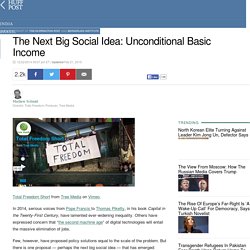
Others have expressed concern that “the second machine age“ of digital technologies will entail the massive elimination of jobs. Few, however, have proposed policy solutions equal to the scale of the problem. But there is one proposal — perhaps the next big social idea — that has emerged: Unconditional Basic Income. The UBI is a monthly monetary income granted every month, unconditionally, by a political community to each of its members from birth. Depending on the nation, in Europe and the U.S. it would probably be $2,500 per adult and $1,500 per child. The Next Big Social Idea: Unconditional Basic Income Robin Hood Open Offices, Events & Labs.
UK's First 'Share Shop' Opens for business. By Lucy Purdy / positivenews.org.uk SHARE - in Frome, Somerset - may be the first shop in the UK where lending rather than selling rules.
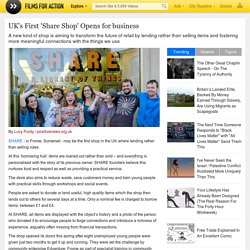
At this ‘borrowing hub’ items are loaned out rather than sold – and everything is personalised with the story of its previous owner. SHARE founders believe this nurtures trust and respect as well as providing a practical service. The store also aims to reduce waste, save customers money and train young people with practical skills through workshops and social events. People are asked to donate or lend useful, high quality items which the shop then lends out to others for several days at a time. Duncan McCann: Community currencies is the real answer to Scotland’s currency conundrum. Socially Responsible Shopping Crawls Upward While Charitable Giving Makes a Comeback in Third Annual Conscious Consumer Spending Index (#CCSIndex)
TOMS Shoes, Microsoft, Honest Company, Whole Foods Among Most Cited Organizations in Inaugural #CCSIndex Top 20 Good Company Poll NASHVILLE, Tenn., Apr. 08 /CSRwire/ - All signs point toward continued, albeit modest, growth in social enterprise and the number of Americans who are doing more good with their daily spending, according to the third annual Conscious Consumer Spending Index (#CCSIndex).
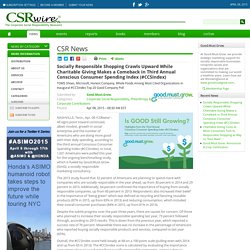
In total, 1,021 Americans were polled this year for the ongoing benchmarking study, which is fueled by Good.Must.Grow. (GmG), a socially responsible marketing consultancy. The 2015 study found that 32 percent of Americans are planning to spend more with companies who are socially responsible in the year ahead, up from 30 percent in 2014 and 29 percent in 2013. Additionally, 64 percent confirmed the importance of buying from socially responsible companies, up from 60 percent in 2013. This Shoemaker Has Turned A Peruvian Town Into A Fair Labor Fashion Hub. In the town of Trujillo, in Peru, there are over 30,000 shoemakers -- and most of them work at the cottage industry level, spending their days working in groups of 5 to 50, in someone's private home.
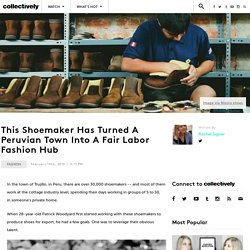
When 28-year-old Patrick Woodyard first started working with these shoemakers to produce shoes for export, he had a few goals. One was to leverage their obvious talent. Patrick Woodyard, co-founder of Nisolo Shoes "These shoemakers are so skilled, they've been doing it for generations," he told Collectively. But despite their skills, they faced a "lack of a market, and a brand through which to tell their story," he added. Image via Nisolo The second goal was to provide fair labor jobs to these shoemakers, and improve their overall lives. To do this, Woodyard's company Nisolo offered its shoemakers decent wages -- calculated using Fair Trade USA's income calculator tools -- as well as paid training on basic financial management and business development strategy. Lesley Riddoch: Share in community-led enterprises.
You too could buy into businesses which are run by and for the benefit of local people, writes Lesley Riddoch I BOUGHT shares in a company last week – for the first time in my life.
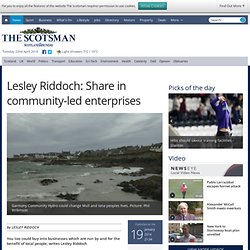
Introducing the Local Bites Podcast. The International Society for Ecology & Culture (ISEC) is pleased to announce the launch of Local Bites, our new podcast series featuring leading voices and inspiring examples from the worldwide movement for localization (listen to one of our first two episodes below).
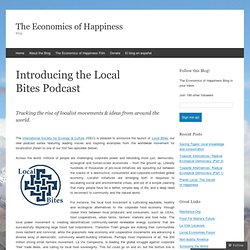
Trade alternatives: an introduction. MEMEnomics by Said Dawlabani (summary) COULD ICELAND LEAD THE WAY TO A MONEYLESS ECONOMY? - Shout Out UK. Iceland could become the world’s first moneyless economy according to Irishman Colin Turner, founder of the Free World Charter (FWC), who has started a campaign to promote the idea of a resource based economy on the North Atlantic island.
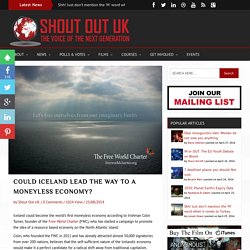
Colin, who founded the FWC in 2011 and has already attracted almost 50,000 signatories from over 200 nations, believes that the self-sufficient nature of the Icelandic economy would make it a perfect candidate for a radical shift away from traditional capitalism. The campaign is already garnering support from prominent Icelandic individuals and organisations as Colin explained: “So why Iceland? It’s an island that could easily become fully self-sufficient in terms of energy and food. There’s also a high degree of political and economic awareness and debate especially after events in recent years that have affected the global economy.”